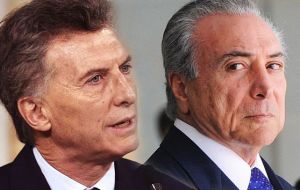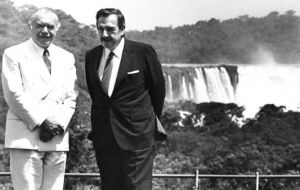MercoPress. South Atlantic News Agency
Temer visits Macri to address trade and making Mercosur more flexible and universal
 Although Macri and Temer have had some previous brief meetings, this will be the first formal bilateral meeting since the Brazilian president was confirmed.
Although Macri and Temer have had some previous brief meetings, this will be the first formal bilateral meeting since the Brazilian president was confirmed.  The meeting takes place on the 30th anniversary of the 1986 friendship and integration accords, signed by then presidents Jose Sarney and Ricardo Alfonsin.
The meeting takes place on the 30th anniversary of the 1986 friendship and integration accords, signed by then presidents Jose Sarney and Ricardo Alfonsin. 
Argentine president Mauricio Macri will be receiving his Brazilian peer Michel Temer in Buenos Aires on Monday morning to address bilateral relations in several fields, mainly political, trade, Mercosur, and security and development in the long shared border areas. According to official sources Temer´s delegation arrives with foreign minister Jose Serra, Industry and trade minister Marcos Pereira and head of defense Raul Jungmann.
Brazil is Argentina's main market for its exports and bilateral trade in 2015 totaled 23bn dollars and so far this year has reached 14bn. Argentina is Brazil´s third export market behind the United States and China.
Brazil and Argentina also share 1.235 kilometers of border including rivers, channels and hydrographic basins which both countries want to develop plus promoting trade and a closer monitoring of security affairs.
Although Macri and Temer have had some previous brief meetings in Rio when the inauguration of the Olympics, in New York at the UN General Assembly and in Shanghai during the G20 summit, this will be the first formal bilateral meeting, which also takes place on the 30th anniversary of the 1986 friendship and integration accords, signed by then presidents Jose Sarney and Ricardo Alfonsin.
This happened when both countries were returning to the democratic track, and since then regional rivalry has been replaced by a strategic relationship.
Likewise Mercosur and Venezuela will be high in the agenda, since the two presidents agree on boosting Mercosur and reaching a trade and cooperation agreement with the European Union, while at the same time expressing deep concern about the deteriorating political and social situation in Venezuela.
“Mercosur is important but we must re-discuss it, not to eliminate it but rather to make it more flexible, and more universal relations with other countries”, argues foreign minister Serra.
The Brazilian administration of president Temer is also interested in propping its international standing given ongoing limited but persistent domestic protests and the fact that the “legislative coup” argument to describe ex president Dilma Rousseff´s removal still has an audience in world forums. Such was the case at the recent UN General assembly when delegates from several Latin American countries left their desks when Temer made his speech.
“We consider it a very positive visit since we are coming out from a complicated situation from both sides. Now we see a scenario of pragmatism for trade links, and we believe we need agreements by sectors, since private companies are the real dynamics in bilateral trade”, said Alberto Alzueta, head of the Brazil-Argentina Chamber of Commerce in Sao Paulo.
Alzueta added that Temer´s objective is to make Mercosur, more consistent, with trade agreements and to ensure the region is again “in the world´s trade and investment radar, and productivity is improved with investments”.
Temer is also interested in recovering the 40bn bilateral trade with Argentina which has now dropped to 25bn, and is determined to remove some of those bureaucracy pockets that hinder business in the Customs of both countries, revealed business leader Alzueta.
The Brazilian president has stated that much of ex president Rousseff's problems were her lack of dialogue with Congress, and described her administration and party as “cowards” for not addressing the much needed reforms to help the economy recover and take off. These reforms refer to limiting public spending; pensions' scheme reform and reviewing labor legislation to favor job stability.




Top Comments
Disclaimer & comment rulesCommenting for this story is now closed.
If you have a Facebook account, become a fan and comment on our Facebook Page!